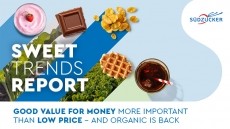Review casts doubt over artificial sweeteners’ intended weight benefits

The Canadian researchers say the review “does not support the intended benefits of non-nutritive sweeteners for weight management".
“Observational data suggest that routine intake of non-nutritive sweeteners may be associated with increased body mass index (BMI) and cardiometabolic risk.”
The conclusions raise a number of concerns especially in light of the increasing popularity of these sweeteners that include aspartame, sucralose and stevioside.
Their use in reducing the sugar content in beverages and snacks raise additional issues, as these foods are popular amongst children and young adults.
Diet versions of soft drinks have enjoyed healthy sales in recent years as full sugared beverages have suffered with declining sales.
Results from the UK department for Environment, Food & Rural Affairs’ (DEFRA) Family Food Survey, published in March noted sales of regular soft drinks decreased by 34.6% between 2010 and 2014.
In contrast, low-calorie drink sales increased by 35.8%. According to the survey, only 38% of all soft drinks consumed are full sugar versions.
Seven RCTs, 30 cohort
Seven randomised controlled trials (RCTs) were selected that looked at the effects of non-nutritive sweeteners.
In addition, 30 cohort studies that reported on adults and adolescent consumption of these sweeteners were also included.
In total, the 37 studies followed over 400,000 people for an average of 10 years. The RCTs involved 1,003 people followed for 6 months on average.
Results compiled by the team, based at the University of Manitoba's George & Fay Yee Centre for Healthcare Innovation, found in the RCTs, non-nutritive sweeteners had no significant effect on BMI.
In the cohort studies, consumption of non-nutritive sweeteners was associated with a modest increase in BMI.
These cohort studies also suggested that consumption of non-nutritive sweeteners was associated with increases in weigh, hypertension, metabolic syndrome, type 2 diabetes and cardiovascular events, amongst other health issues.
"Despite the fact that millions of individuals routinely consume artificial sweeteners, relatively few patients have been included in clinical trials of these products," said author Dr Ryan Zarychanski, assistant professor at Rady Faculty of Health Sciences, University of Manitoba.
"We found that data from clinical trials do not clearly support the intended benefits of artificial sweeteners for weight management."
"Caution is warranted until the long-term health effects of artificial sweeteners are fully characterized," added lead author Dr Meghan Azad, assistant professor, Rady Faculty of Health Sciences, University of Manitoba.
ISA reaction
The International Sweeteners Association (ISA) pointed to the raft of evidence from human intervention studies, systematic reviews and meta-analysis that refuted these findings.
In a statement in response to the review, it argued that claims were not confirmed by the findings of the meta-analysis of RCTs conducted by the authors of this paper.
“There is not a single published RCT that has shown that low calorie sweeteners use can lead to weight gain or any negative health effect,” the association stated.
“Evidence from RCTs is clear and consistent pointing to a modest benefit of low calorie sweeteners’ use in weight loss and maintenance.”
The Association was also critical of the selection criteria used for the meta-analysis of RCTs in this study.
It claimed the study choices led to the “exclusion of several well-designed clinical trials that were included in a previous, more thorough, systematic review and meta-analysis.”
Source: Canadian Medical Association Journal
Published online ahead of print: DOI: 10.1503/cmaj.161390
“Nonnutritive sweeteners and cardiometabolic health: a systematic review and meta-analysis of randomized controlled trials and prospective cohort studies.”
Authors: Meghan Azad et al.


























